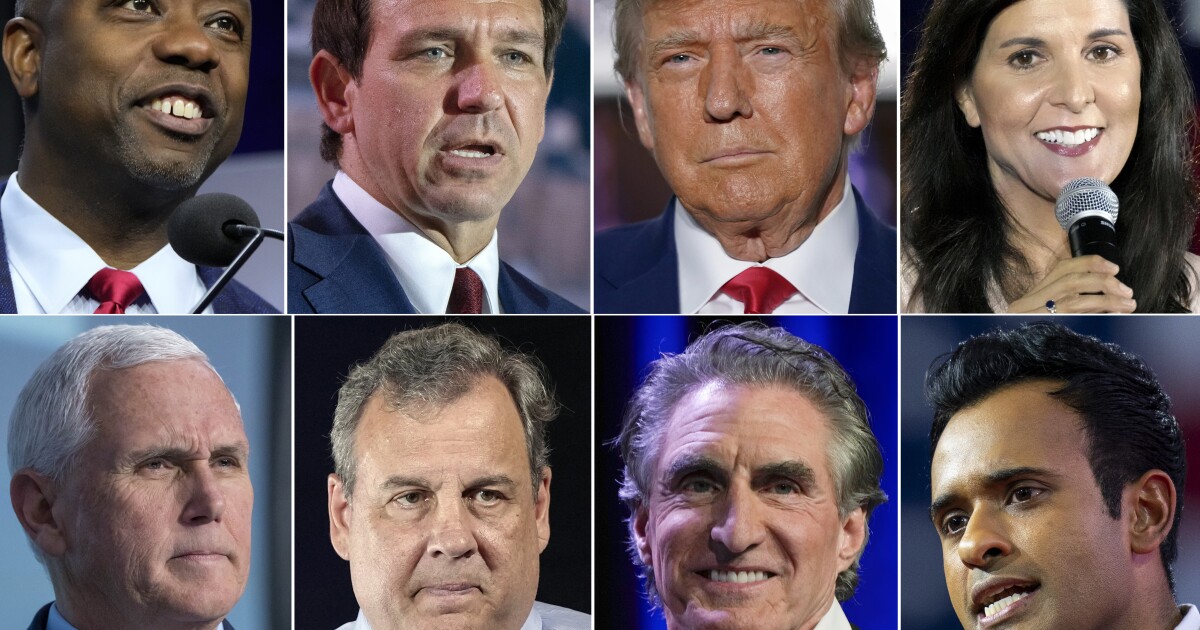

With former Vice President Mike Pence qualifying for the first 2024 Republican presidential primary debate, he and the six other candidates can start settling on their strategies before they take the stage in two weeks.
But those strategies may have to be scrapped depending on whether former President Donald Trump, the race’s front-runner, decides to take part.
HERE’S HOW TRUMP’S 2024 GOP RIVALS CAN GET UNDER HIS SKIN
With the 2016 debate drawing an audience of 24 million people, the candidates should focus on President Joe Biden‘s failings when they are in Milwaukee on Aug. 23, according to Republican strategist Cesar Conda.
“The two primary issues voters care about are issues related to the economy, including inflation and jobs, and who can beat President Joe Biden,” Conda told the Washington Examiner.
“Some candidates will want to cozy up to former President Trump because they are angling for a VP or Cabinet slot,” the founding partner of lobbying group Navigators Global said. “Never Trump candidates will be hammering Trump the whole debate. The real candidates who are vying to win will focus on Biden.”
Ed Lee, director of Emory University’s Alben W. Barkley Forum for Debate, Deliberation and Dialogue, partly agreed, predicting Trump will be largely ignored as he was eight years ago in Cleveland.
“It will be really weird for this person to be significantly leading in the polls, to have a lot of things that you could point to that you would find disqualifying in other candidates, but would functionally be the third rail because it means that you may not make it to the stage the next time if your polling numbers drop by a few percentage points,” he said. “Everyone will be hesitant to target him, then talk about him when we get later in the election cycle. That’s what happened eight years ago. No one wanted to engage him until it was too late.”
University of Michigan debate director and co-author of Debating The Donald Aaron Kall advised Trump critics, such as former New Jersey Gov. Chris Christie, to be mindful of who will be in the room as they consider their attacks. Christie’s campaign has hinged on the debates.
“If it is stacked with a bunch of Trump supporters, that will be really important just to see how these attacks play in real time,” Kall said.
As Fox News, the host of the two-hour debate moderated by Bret Baier and Martha MacCallum, try to persuade Trump to participate privately, Christie’s super PAC, Tell It Like It Is, is attempting to do so publicly with a 60-second digital and cable advertisement asking the former president whether he is “a chicken or just a loser?”
Primary voters deserve the opportunity to compare the candidates side by side, particularly after the Jan. 6 attack on the Capitol and the former president’s indictments, per another Republican strategist, even if that means the debate becomes the “Trump show.”
For the strategist, Gov. Ron DeSantis (R-FL), the candidate in second place, will receive the most scrutiny after replacing his campaign manager Generra Peck with his gubernatorial chief of staff, James Uthmeier, amid concerns about his polling, fundraising, and spending.
“He wants to be Trump without the baggage, yet every single instance that he’s had there has been drama,” the source said. “His team is not in control. His team is not disciplined. … His campaign is not doing himself any favors with the amount of restarts and drama they get themselves into.”
Lee, who is also the owner and principal creative for Converselee, LLC, added DeSantis is likely to spend the majority of the debate defending his record in Florida, which is “increasingly something that he wants to run from instead of run on.”
“The way in which these debates are set up, that you can get an idea of who has a sense of legitimacy, who do you perceive to be a threat based upon who the other candidates are talking about?” he said.
While DeSantis expects to be challenged, the lower polling candidates will be provided with a platform to reintroduce themselves to the public.
“If there’s solid performances by some of those that are not polling very well and not very well known, then that could ensure that they stay involved in future debates as we go on to California,” Kall, the Michigan coach, continued. “The [Republican National Committee] is really ramping up their criteria, and so this could be just a ‘one and done’ for several of the candidates unless they’re really able to increase their pace in polling and donations.”
Candidates must have 3% support in two different national polls or 3% in one national poll and two polls from separate early primary or caucus states to qualify for the second debate at the Ronald Reagan Presidential Library in Simi Valley, California, on Sept. 27. Candidates must additionally have 50,000 unique donors, with at least 200 donors from at least 20 states or territories, as well as sign a loyalty pledge.
Pence’s qualification extends his campaign “a few more weeks or months,” with not doing so being the “instant death” of his bid, according to Kall.
CLICK HERE TO READ MORE FROM THE WASHINGTON EXAMINER
“Probably this ensures that even if Trump is not onstage, the issue of Jan. 6 becomes more prominent because he’ll likely get asked about that,” he said as Pence fundraises off of his cooperation with special counsel Jack Smith’s federal 2020 election investigation.
Trump averages 54% support, DeSantis 16%, biotechnology entrepreneur Vivek Ramaswamy 6%, Pence 5%, former U.N. Ambassador Nikki Haley 4%, Sen. Tim Scott (R-SC) 3%, Christie 2%, and Gov. Doug Burgum (R-ND) 0.5%, per RealClearPolitics.





